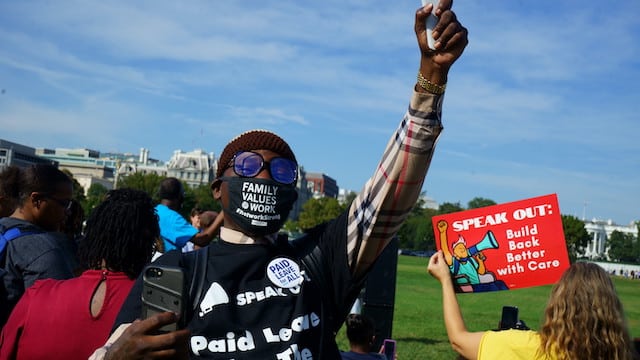FMLA Anniversary 2022: Looking Back to Move Forward

In 1993, President Clinton signed the Family and Medical Leave Act (FMLA) into law, which provides unpaid leave to just over half of US workers. On this 29th anniversary of the law, it’s poignant to note that babies born in 1993 are old enough to have children of their own. Another generation has arrived in a nation with no universal paid family and medical leave law in place.
FMLA allows eligible workers to take an unpaid leave of up to 12 weeks and be able to return to their jobs, should they choose. Leave is provided for workers who need to care for a new child, recover from illness, care for a sick family member, or deal with certain circumstances that come with being in a military family.
Though these are great benefits, the act has several significant shortcomings. For instance, it only applies to businesses that have at least 50 employees, and workers must be employed at the same place for at least a year, limitations that impact almost half of the US workforce. Its definition of “family” is narrow, as it doesn’t recognize that not all families are nuclear or based on genetic commonality. And although employers must maintain a worker’s benefits while they’re on leave, the leave is unpaid.
For nearly two decades, Family Values @ Work has worked diligently to secure a national paid and family leave policy that provides workers with 12 weeks of leave, no matter how long they’ve been employed at a business, how much money they make, or whether their family is of blood relation, formalized by law, or chosen.
As we enter year three of the COVID-19 pandemic, it’s beyond time for a national paid leave policy. And it’s beyond shameful that the Senate has yet to respond by passing paid leave–the most recent opportunity being a Build Back Better–which would undoubtedly make the lives of their constituents easier. Instead, our elected officials continue to treat paid leave like it’s something negotiable, a throw-in (or -out) in a contract with the American people, and not a right we should all be able to exercise when the time comes. They continue to ignore or shrug off the fact that supply and worker shortages and long wait times are a direct result of a lackluster COVID-19 response that didn’t prioritize workers and the families of workers — people who have risked their health, and in many cases their lives, quite simply because they couldn’t afford to miss a day of work.
At the same time, we’re encouraged by the fact that workers are leading the fight for better labor conditions and benefits by unionizing, refusing to work in unsafe or abusive environments, and advocating for wages and worker protections, like an adequate national paid leave policy.
FV@W will continue to play its role in the fight for paid leave. We’ll also continue to center the voices and experiences of women, queer folks, BIPOC, and other historically excluded groups in each aspect of that effort. Although anniversaries are often occasions to mark how far we’ve come, the 29th anniversary of FMLA is a time for us to take a look at how far we have to go.